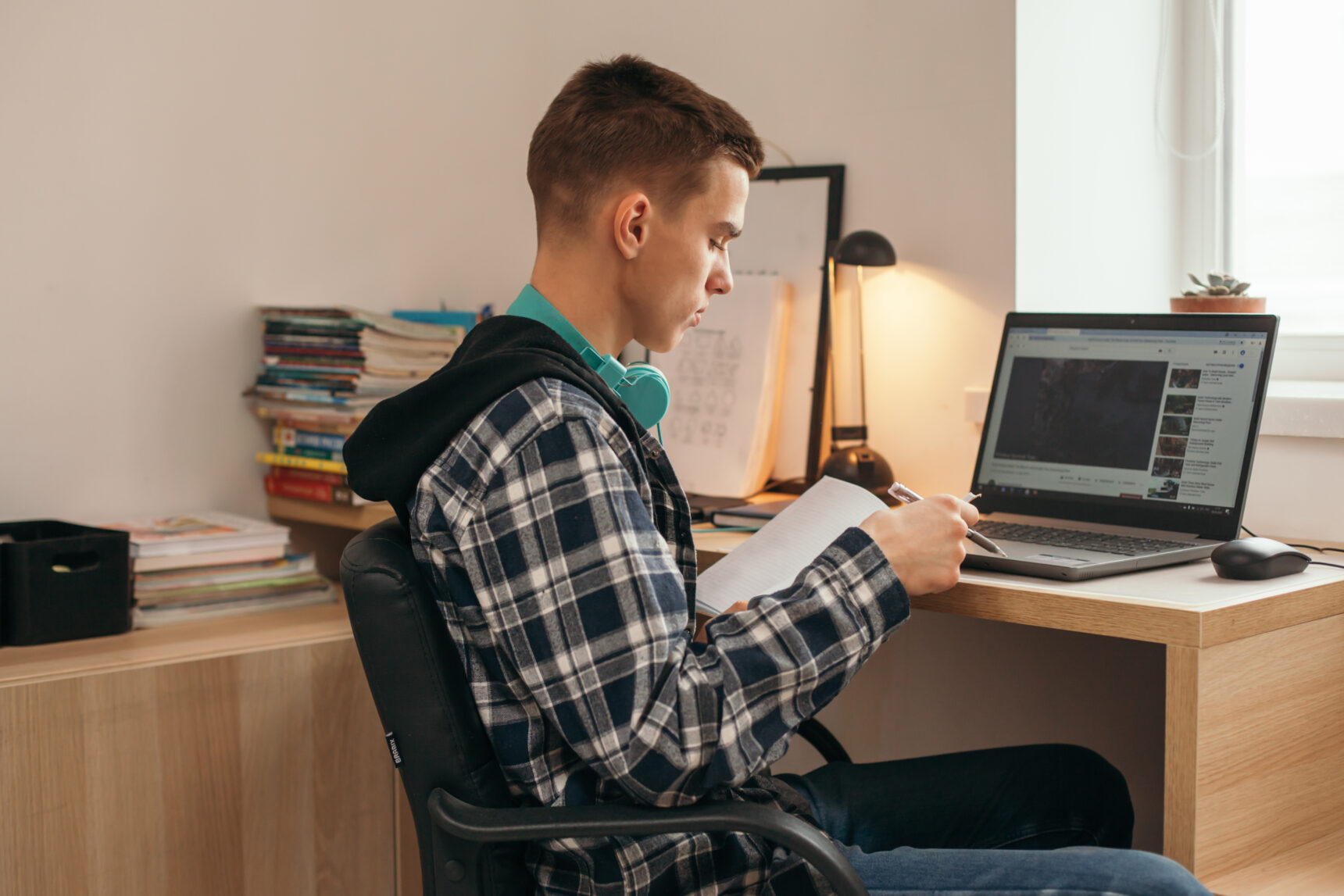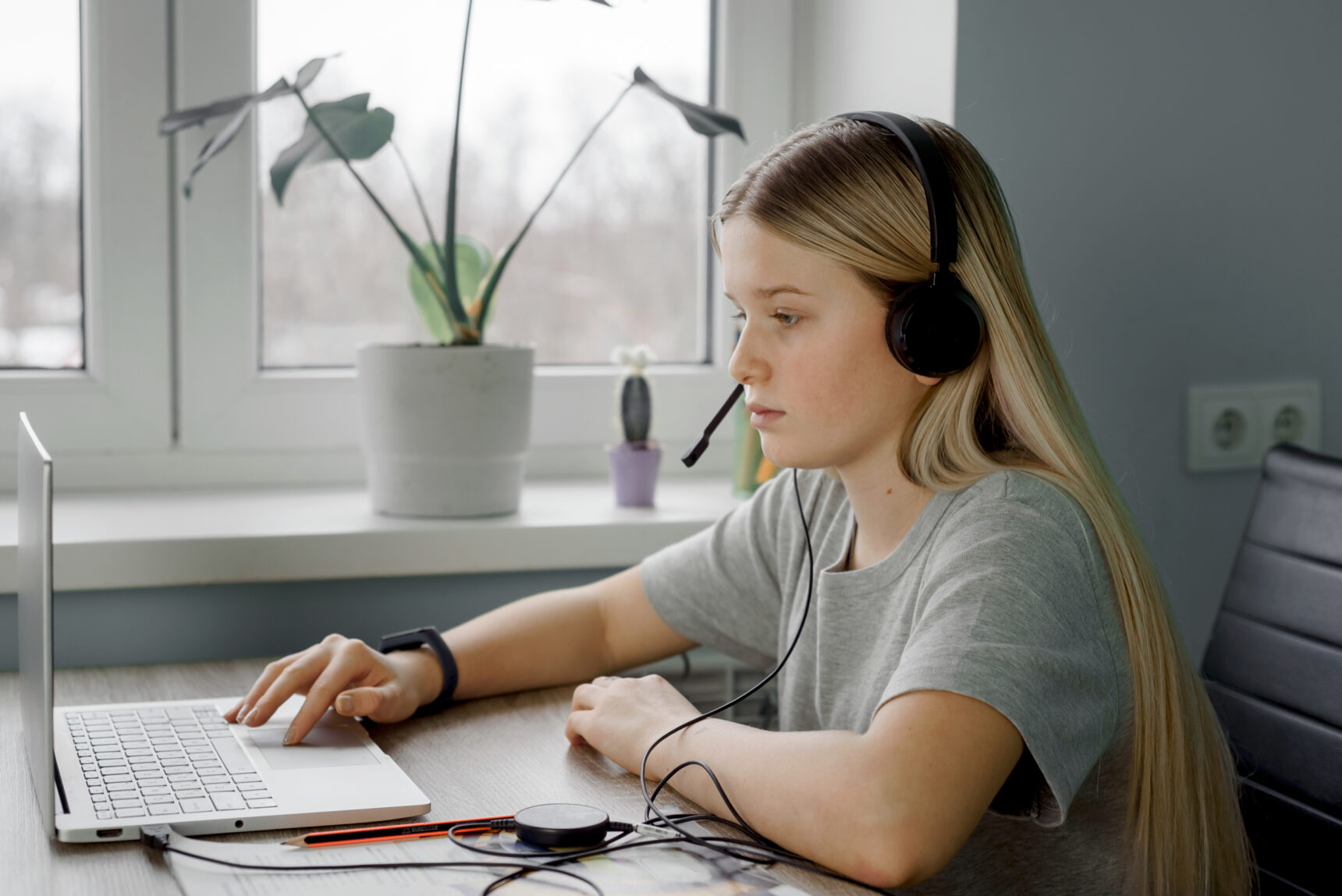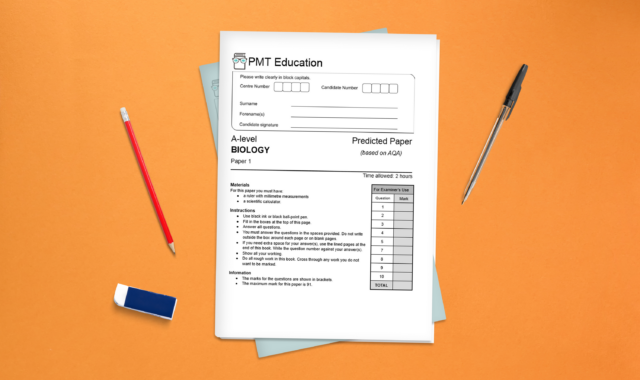Contents:
Wherever your teen is on their educational journey, having a comfortable, well-organised, and distraction-free study space can significantly impact their ability to build good study habits and achieve their best results.
However, creating the ideal study environment isn’t always easy, especially in busy households where the everyday noise and activity of family life can include younger siblings, pets, or parents working from home. There’s also no one-size-fits-all approach. Every home is different, and so is every student.
That said, there are some key elements that can make a big difference. In this article, we’ll explore practical ideas for helping your teen create a study space that works for them.
1. Provide a designated study space
Having a dedicated study space can make it easier for your teen to get into a productive mindset and stay focused and organised. But where should it be located?
When deciding on the best spot, consider how your teen’s surroundings might affect their ability to study. Ideally, you want a quiet, well-lit area with minimal distractions.
Here are a few important factors to keep in mind.
Individual needs and preferences
The ideal study environment varies from student to student. For example, while some need complete silence to concentrate, others may work better with some background noise. Talk to your teen about what helps them focus, and experiment with different setups until you find what works best.

Bedroom vs communal areas
Deciding whether to set up a study space in your teen’s bedroom or a shared part of the house often comes down to practicalities—like space, layout, and how busy different rooms tend to be—as well as your teen’s individual study style. Do they prefer a private space with a closed door, or do they like staying more connected to what’s happening around the house?
Bedrooms offer privacy and a sense of familiarity, which can be great for deep focus. However, they also bring the temptation of curling up in bed or switching into relaxation mode. If your teen chooses to study in their bedroom, try to position the desk so it faces away from the bed. This can help maintain a mental separation between work and rest.
Not all teens have their own room, or their room might not be ideal for studying. In these cases, other areas like the dining table or a corner of the living room can work well, especially if you can organise designated study times.
While communal areas may be more prone to noise and interruptions that can negatively affect your teen’s ability to concentrate, they can also provide structure and a sense of accountability.
If you have a home office, it might also work as a study room—just make sure it’s available and set up with your teen’s needs in mind.
Lighting and ventilation
Beyond choosing a quiet space, think about lighting and air quality. Natural light has been linked to improved mood, focus, and academic performance, so try to set up your teen’s study space near a window if possible.
Good ventilation is just as important. A stuffy study room can lead to fatigue and difficulty concentrating, so encourage your teen to open a window or use a fan to keep the air circulating.

Using the local library
If studying at home proves tricky or if your teen needs a change of scene, the local library can be a great alternative. Many libraries have dedicated study areas with comfortable seating, free Wi-Fi, and access to useful resources like textbooks and reference materials.
Studying at the library can also help provide structure and routine. Setting specific times for library visits can help establish a consistent study schedule, and the act of going somewhere to study can reinforce discipline and motivation—especially if your teen is on study leave and missing the structured routine of school.
Top tips
- Help your teen pack a study bag with everything they need, including healthy snacks and drinks to fuel their revision sessions.
- For consistency, they could lay out their library desk with their study materials in the same way they would at home. And, like at home, choosing a spot with natural light and minimal noise can really help them stay focused.
2. Choose comfortable and practical furniture and lighting
The right furniture and lighting for a study room can make a big difference to your teen’s comfort, focus, and energy levels during long study sessions.
Study space essentials include:
An ergonomic chair
A supportive chair is ideal. Look for one with an adjustable height and backrest to promote better posture and help prevent discomfort during extended periods of sitting.
That said, a normal kitchen or dining chair is fine, too. The main thing is avoiding spots like beds or sofas, which aren’t great for focus or posture.

A spacious desk
Choose a desk with enough space to comfortably fit a laptop, textbooks, notebooks, and other learning materials without feeling cramped.
If possible, add drawers or shelves nearby to keep supplies organised and within easy reach. A cable tidy can also help keep wires from lamps and devices neatly tucked away.
Alternatives to a traditional desk and chair
Not all students thrive at a standard desk setup—and that’s okay. Some teens find that switching things up helps with focus and energy levels.
If a standing desk or a gym ball is available, they can be great for reducing restlessness and encouraging movement. Others might prefer working at a floor desk or a low coffee table with cushions for support.
The key is to involve your teen in exploring what works best for their comfort and concentration.
Lighting
While natural light is ideal, it’s not always available, especially in the winter months or for evening study sessions. A bright, adjustable desk lamp can help reduce eye strain and help your teen stay comfortable and focused.
Wall space and visual tools
Having some wall space beside or above the desk is useful for hanging a noticeboard or whiteboard, where your teen can pin reminders, revision timetables, or visual study aids like mind maps or posters.
You could also hang a wall clock or place a small desk clock nearby to help them keep track of time without needing to check their phone—reducing the temptation for distractions!
Top tip
Creating a comfortable, ergonomic study space doesn’t have to be expensive. Repurpose furniture you already have, or check out charity shops and online marketplaces for budget-friendly options.

3. Create a study-friendly atmosphere
Beyond setting up the practical elements of a study space—like ergonomic furniture and good lighting—parents can play a big role in shaping the overall environment. Creating a calm, focused atmosphere isn’t always easy in a busy household, but a few small changes can make a big difference.
Minimise family distractions
Reducing household noise and interruptions during study sessions will help your teen stay focused—especially during high-pressure times like exams.
Where possible, try to schedule noisy chores and family activities around their study times. This might mean holding off on hoovering, postponing loud phone calls, or asking younger siblings to play in another room.
It’s also a good idea to plan social events—like playdates, visits, or family gatherings—at times that won’t interfere with their studies.
If your home is naturally noisy, a pair of noise-cancelling headphones or soft background music can help your teen tune out distractions and stay in the zone.
Foster a calm, supportive environment
A peaceful home environment can go a long way in helping your teen concentrate and feel supported—especially during intense study periods like the run-up to exams.
Encourage a positive attitude towards learning, and try to minimise stress where possible. Simple things like offering healthy snacks, providing gentle encouragement, and helping your teen keep their study space tidy and organised can all help them to feel supported.
For more ideas, check out our article on supporting your child during exam season.

4. Minimise digital distractions
Digital distractions are one of the biggest challenges for students today—and let’s be honest, we all know how tempting it can be to check our phones every few minutes! For teens, the pull of social media, messages, and group chats can be hard to resist during study time.
Setting up tech-free periods or focused study blocks with scheduled short breaks to check their phone can help your teen stay on track without feeling completely disconnected.
Here are a few strategies to help them stay focused:
- Use ‘Do Not Disturb’ or Airplane mode: Encourage your teen to switch their phone to Do Not Disturb or Airplane mode during study sessions. This simple step can prevent incoming calls, messages, and notifications from breaking their concentration.
- Try website and app blockers: Tools like Cold Turkey or Freedom allow users to create custom block lists for distracting websites and apps.
- Make focus fun with revision apps like Forest: With the Forest app, your teen “plants” a virtual tree at the start of a study session, and if they leave the app, the tree withers away. Over time, they’ll grow a whole forest, which can be a motivating visual representation of how focused and disciplined they’ve been.
5. Personalise the study space
A personalised study space can make revising more enjoyable and boost your teen’s motivation.
Encourage your teen to add decor and accessories that inspire them, such as photographs, artwork, or motivational quotes. Including plants can also help improve mood and reduce stress levels.
However, it’s important not to go overboard—too many decorations can end up being distracting rather than motivating.

6. Keep the study area organised and clutter-free
Clutter is not only distracting, but it can also contribute to feelings of stress and overwhelm that make it harder to stay focused. A tidy, well-organised study space can make a big difference to your teen’s overall productivity and ability to concentrate.
Encourage your teen to use desk organisers, trays, and folders to keep their revision resources, stationery and other essentials in order.
Labelling or colour-coding folders can help them quickly find resources for different subjects. If they use a lot of flashcards for revision, an index box is a handy way to keep them neat and accessible.
Regular decluttering is key. Support your teen in getting into the habit of tidying up their study space at the end of each session—filing away old notes and recycling unnecessary papers. This prevents clutter from piling up and means they’ll have a clear, ready-to-use space next time they sit down to study.
Don’t forget about digital organisation. Encourage your teen to sort files into clearly labelled folders on their computer. They can also bookmark useful websites and online revision resources for quick and easy access.
A well-thought-out study space, along with your encouragement and support, can go a long way in helping your teen feel confident, capable, and ready to tackle their academic goals.
There’s no one-size-fits-all setup, so the best thing you can do is involve them in the process, stay flexible, and don’t be afraid to experiment until you find what works best.







Comments